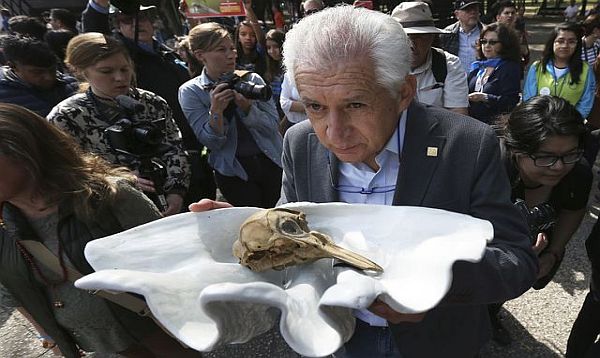Mexico City - Activists and artists in Mexico held a mournful, dirge-like procession Saturday for the critically endangered vaquita porpoise as the species' numbers fell below 30.
With drums, chimes and a carved vaquita skull, hundreds of people made their way through a downtown Mexico City park. Organizers said the procession wasn't a funeral for the vaquita, but experts say that the population continues to decline by 40 percent annually.
The vaquita's numbers have been decimated by nets set for the totoaba fish, whose swim bladder is considered a delicacy in China and commands high prices. The totoaba itself is also endangered.
 |
"Their survival depends on authorities of all three countries (Mexico, China and the United States) stopping the illegal fishing and trafficking of the swim bladders," Vidal wrote. "But given current conditions, it is very probable that the vaquita will go extinct soon, and that the totoaba and many other species will follow it."
An effort to capture vaquitas and possibly breed them was abandoned last year after a vaquita died soon after being captured.
The Mexican government's ban on gill nets in the upper Gulf of California has also provoked confrontations with poachers who use speed boats, lead authorities on hours-long chases, and operate at night.
On Saturday, marchers carried life-size figures of the tiny porpoise and deposited the carved skull in Mexico City's Anthropology Museum, anticipating a coming era when museums may be the only places where vaquitas will be found.
"This is an act of mourning for the vaquitas that have died, but it is in no way a funeral procession," said Lorenzo Rojas, the lead scientist with the vaquita conservation effort.
Biologist Leobardo Montes, 24, also attended the procession.
"They say that hope is the last thing to die, but the data indicates that it would be very difficult for vaquita marina populations to recover," he said.
Source: Seattle Times


